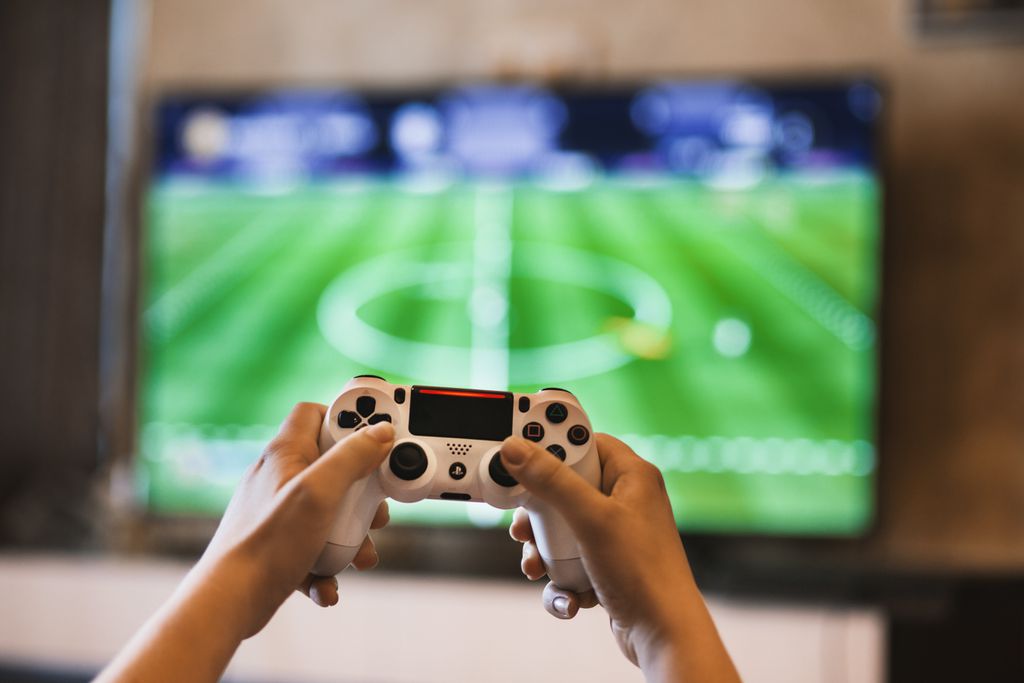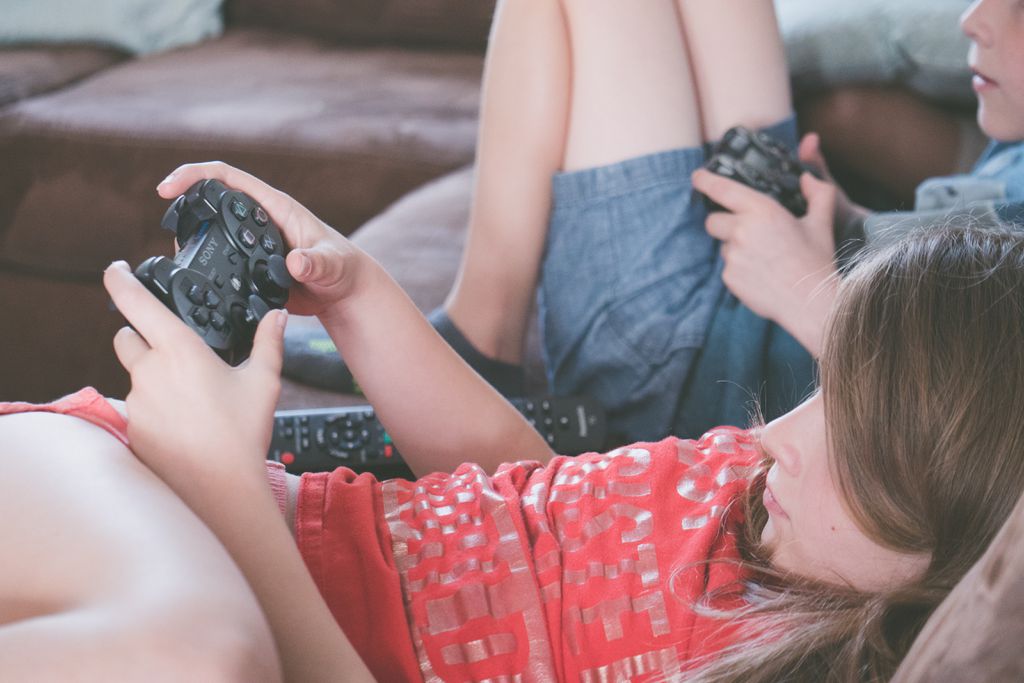The more the years go by, the less the differences in tastes between men and women are distinct. There is no denying that, since the world of consoles and computer games, for example, we see that men are more interested in this type of entertainment. But calm down! This is not an absolute truth, but information already conditioned in our brain, as it is what we see most around (and which does not always match reality).





Stop and think: if you take a quick look back, you’ll notice that the majority of video game store clerks were men. Boys, in most cases, received Christmas consoles, while girls received dolls and women’s kits. The lan houses were full of boys playing Counter Strike into the early hours, without any girls. All these realities are getting old-fashioned — and believe me, the world is changing.

Even with all this evolution going on, if we are to consider how things were 10 years ago, for example, the reflection remains: do women really not like video games and technology as much as men, or do we just not witness it as much? frequency? And why didn’t women, in the old days, show this?



Want to stay on top of the best tech news of the day? Access and subscribe to our new youtube channel, Canaltech News. Every day a summary of the main news from the tech world for you!
Difference between male and female brain
The report Girls vs. Boys: Brain Differences Might Explain Tech Behaviors , presented by The Wall Street Journal, reveals research that analyzes the brain reactions of men and women when in contact with video games to try explain the behavior of each one in relation to this technology.
The motivation of the study, according to the author, is how the children’s parents observe the distinctions between genders. “Many parents of boys and girls have seen major differences in the way their children use technology, with their sons generally preferring video games and daughters spending more time on social media,” the report says.
For Larry Cahill, a professor of neurobiology and behavior who has studied gender differences in the brain for 20 years, “It’s completely plausible, from a neurological perspective, that there is an underlying biological component to this difference that people are seeing.”



Study results
The study took place with researchers from universities in China, along with Marc Potenza, professor of psychiatry at Yale University, in the United States. Functional magnetic resonance technology was used, which analyzes brain activity by detecting changes in blood flow.
The tests were applied to young women and men, in parts of the brain responsible for the feeling of reward and satisfaction, factors that can end up generating addiction.
The results revealed that men showed higher levels of activation of these parts of the brain when they looked at pictures of people playing video games, while women showed milder reactions. With this, it was also concluded by the researchers that men are more likely to develop disorders.
Photo: Playback/Jessica Lewis
On the other hand, women and girls are not free from experiencing some disturbance in relation to technology, as the article explains, showing that social networks such as Facebook and Instagram can cause problems of acceptance and inclusion in society more in girls than boys, in addition to anxiety.


In fact, things are not simply unraveled like this, as this research leads us to other questions: are the scenario and experience of these boys and girls the same? Were they raised with access to the same things, without prejudice? The study analyzed the brains of men and women, but without counting the social construction that caused tastes to be formed. To make it more didactic, let’s give an example. If you analyze the reaction of the brain of a girl who has never had contact (or an equal contact with brothers and cousins) with video games, the chances of there being no stimulation are greater.
Just as there are boys who are also not interested in video games or have never had contact, if they were subjected to this test, there would also be chances that there would be no stimulation. While, in general, boys are more conditioned to like electronics, girls are more won over with entertainment that leads to beauty and acceptance, hence the constant need to receive approval on social media and feel symptoms of anxiety for this. These differences, therefore, are reflections of society.





Are there neurological differences between men and women in terms of tastes or is it a social construction?
To better understand the difference between these differentiated behaviors in technology, in relation to the female and male gender, we talked to Evelise Galvão de Carvalho, graduated in psychology, master in forensic psychology and speaker on technology and gender violence on the internet. We asked the professional if, in fact, there are neurological differences that define our tastes and behaviors, regardless of experience. The expert replied that a human being is a biological, psychological and also social being.
Image: Reproduction/Science News Journal
“It is very simplistic to condition the existence and especially the tastes of individuals taking into account only one of these factors. We can say that men have more spatial capacity, but this does not prevent us from having female pilots who compete on an equal footing”, he explains. .
The professional also talks about a concept called brain plasticity, which says that the human brain is constantly changing throughout life, according to how much it is stimulated.
“So even if someone is born with more biological propensities for something, if there is no stimulation, [the skill] will not develop. The same goes for matters that we are not very skilled at. We are not defined at birth, we are born as a book. in which the experiences that will follow will shape my personality, tastes, skills and that can all change at any moment in our lives”, he adds.
Evelise, then, talks about the differences in which boys and girls are raised, relating it to the facts that we have witnessed in society for a long time. The psychologist explains that many girls who like technology and video games end up avoiding the topic, as there is a fear of receiving criticism because, in fact, it is something that happens a lot.


“A woman who likes technology will play and suffer various types of verbal aggression for the simple fact of being a woman, this is already slowly undermining the will to play, not because of lack of interest, but because of the prejudice she suffers”, says the psychologist. So, because they have always been conditioned to have other interests, when it is shown what they really want, criticism, lack of belonging and disapproval come.



Image: Reproduction/John Sting
Evelise exemplifies some of this social construction with something that children have contact with since birth. “Usually, we see toys for girls that stimulate the caring, gifted side, while for boys we see toys that stimulate imagination, limits, competition and etc”. The psychologist says that family development at home contributes a lot to the theme, talking about the differences in punishment. “A girl who stands in front of the video game competing and has aggressive behavior is more likely to be punished for that behavior than if she were a boy in the same context,” she says.
The professional also takes the opportunity to explain reasons that often make girls of different ages feel repressed to accept or share that they like something that, according to society, was not imposed on them.
“When I started playing online (15 years ago) this part of my life was something I didn’t share with others, because every time I got nasty and derogatory comments. Luckily, I always had a family that supported me in my tastes, made me not give up. We women hear a lot ‘this is not for you’ and I think we are living in a moment in which, yes, everything can be for us. Certainly, if you insert yourself in some contexts it will require more efforts, sacrifices. with any prejudice and barrier takes some time”, he exemplifies.
Evelise gives talks on gender violence at inter (Image: Personal collection)
Finally, Evelise states that it is already possible to observe an advance in the occupation of space. “Women, according to PGB 2019 data, account for 53% of gamers, surpassing men. In a phenomenon that was already being observed in recent years”, she says. However, being the majority, for the psychologist, does not mean the achievement of appreciation. “We see in the professional field that there is still no female representation, there are even e-Sports championships that don’t allow mixed teams, something that in my view doesn’t make sense”, she adds.
When there is space, the situation is different
In other perspectives, the results of these tests would be different. To better understand the reason for this, we talked to three girls who had a different scenario at home, with no restrictions on what they should like or not, some with a lot of encouragement, including.
Letícia Duarte, a civil servant and psychology student, for example, has always been linked to technology, but she only had the opportunity to play games often when she got married. Today, she feels comfortable playing alongside her husband, but confesses that at first she felt strange, with the impression that she was doing everything wrong. That’s even with the boy claiming that she plays better than him.


The interviewee has always been interested in the subject, but because she lives in the countryside, she did not have the same access to it compared to children who grew up in the big city. When she had contact with a video game for the first time, Letícia was 10 years old and remembers not touching the console because it belongs to her cousin and because she had ingrained the thought “it’s a boy thing and you’ll never be interested”.
Fortunately, it was never forbidden for the employee and there was also no lack of incentive for being imposed as something of the other kind in general. The differences between boys and girls presented in society were not something that affected her family.
Letícia agrees that, to this day, there is a repression against women because they say they like to play, especially in multiplayer games, but that, in the end, it’s okay to like video games or not. “If you play, you may find that you don’t like it and that’s ok, but you may discover that you like it and have a new hobby. And who doesn’t need a hobby to dive in and leave reality a little aside, right?”, complete.


Letting girls have contact with the world of technology and video games can also be essential to help their future career, as it is an area in growing evolution. Thais and Monique, for example, were never repressed and saw it as a passion, which consequently became a livelihood.


Thais Matsufugi is 30 years old, has a degree in game design and produces content for the internet on the subject at GameplayRJ, presenting the RESET board, in addition to having a YouTube channel about games, alongside Mariana Ayres, called Mari and Tha . Unlike many girls, Thais did not have an older brother who introduced her to games as an only child. But that didn’t stop her family from introducing her to this world.
“I got my first video games when I was only 3 years old. My parents separated when I was 5 years old, and with that, I ended up being more stuck at home than with the kids on the street. I believe my mother saw in video games a way for me to have fun even alone and that’s why I always encouraged my games by giving me new games and consoles that I didn’t have”, she says.


The presenter was also lucky to never be blamed in the family, including that passion being her trademark. Regarding the “older brother who lends the games to the younger sister”, in Thais’ life it was she who played this role.
“Nowadays I’m the one who gives my brothers video games and my parents love it because they end up playing too. Even older cousins come looking for me to find out about news or game recommendations. I even have a 10-year-old cousin who already he wants to work in the area because of me and his mother encourages and still uses me as an example. It is gratifying to see the support that my family gives me and has always given me”, he celebrates.
Thais’ childhood also escaped the stereotype rule, which says that “boys play video games and cars, and girls play dolls”. She had both. In her life and family, a toy was a toy, period, without gender restrictions. Not even in the classroom Thais felt recrimination, quite the opposite. She says that liking what she likes also caused her personality to be created within the school.
“One day, Anhembi Morumbi went to lecture about her courses to the students and when the representative of the Game Design course took the stage, everyone in my room started to point and say: ‘Tha! Look at your course!'” , reports Thais.
She recognizes all the privileges she has had and believes that, unfortunately, she is an exception, just like her family. “I ended up being raised as a child and not just a girl. My mother has been on her own since forever, so I grew up seeing and believing that women can do anything. I was taught to cook and wash dishes, but I didn’t eat an obligation but as something that I would eventually have to know how to do to make it on my own like her”, she comments.
But protection at home and at school was not the same in adult life. Thais says that he has worked in a video game store and, even proving his experience in the matter to a client, he raised his voice and wanted to show superiority.
“Once, two guys stopped at the counter and one of them came to ask me what console he was buying, because he was in doubt between Xbox and PlayStation. Based on what he told me, I gave my opinion. attack saying that if I took anyone who studies in the area I would see that I was wrong and that the other console was the good one. I then said that I had studied game design for 2 years and that I knew what I was talking about. Immediately, he raised his voice to me and said, “Then you’re in the wrong area! Your area is the one that has a washing machine. Do the dishes again!”, says Thais, saying that this was the most serious episode of prejudice she has ever faced.


Today, the presenter says that people are becoming more open-minded every day, and that there are countless girls interested in video games out there, which alleviates the fear of not feeling accepted. “If you like video games, go for it! You don’t owe anyone anything! There are a lot of amazing girls out there who publicly play games online with other girls,” she advises.
Moni, 34, has studied Literature and now works with an exclusive content channel about Resident Evil on the internet. She was introduced to the world of video games thanks to her older brother, who has always been very fond of technology. They always supported each other a lot and, ironically, today, she is the one who ends up influencing her brother the most, mainly because she is always attentive to what has been happening.
At home, Moni was also lucky to have a brother and father who like video games, with the exception of her mother, who is not very tech-savvy, but who was still the person who taught her how to play. The division between her and her brother became even with the passage of time, it was no longer just him who won the consoles and games to become a gift to both.


At school, the situation was different: the prejudice suffered came from the girls themselves, while the boys were the people she talked to about the subject, because they thought it was something “boyish”. This lack of female support meant that debating topics about games and technology did not happen much outside the home, as these girls were conditioned to like what was imposed on their gender.
Regarding the neurological differences between the #sexes, Moni believes that they may exist, as mentioned in the study, and that women tend to multitask more than men, which is an advantage. She also says that these differences do not seem to make much sense in terms of tastes, but in characteristics such as focus, for example.
In fact, Moni says she has known several boys who didn’t like video games and who even thought it was strange that others liked it so much. “If the difference in tastes existed, all boys would like video games, which is not the reality,” she says.
Regarding the prejudice faced until today by girls, Moni advises saying that “if you have to prove yourself ten times more, prove yourself ten times more”. “That’s what I always say to girls: if a guy asks you what Resident Evil characters you like, say the darkest characters yet, to make him more embarrassed,” she jokes.
What does all this mean?
Based on the social construction issues cited by the psychologist, it would be more correct to do this research with a boy and a girl who have had access to the same things since forever, without any restrictions due to their gender, without any form of inequality. What’s the point of studying two different genres on the same subject, if there wasn’t equal scenarios and equal opportunities, right?


“Scientists are only evaluating from a biological point of view, since the human being is biological, social and cultural. And when we talk about building tastes and personality, if we focus on just one of these aspects, we won’t be seeing the whole. It ends up being an incomplete analysis”, comments Evelise.
The interviewees show that, yes, women can like it — and they do! — of games and technology as much as men. Fortunately, this scenario is changing and more and more we see girls working in the field and completely immersed in this great and fantastic universe.
With information from the New York Times.